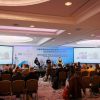The third session “Stronger Together: Ukraine, Accession Countries, and Europe’s Security Interdependence” of the 4th EU Accession Exchange Forum examined why Ukraine’s EU accession cannot be separated from Europe’s security architecture. Speakers emphasized that Ukraine today serves as a security provider for the continent, defending not only its own sovereignty but the very foundations of European peace.
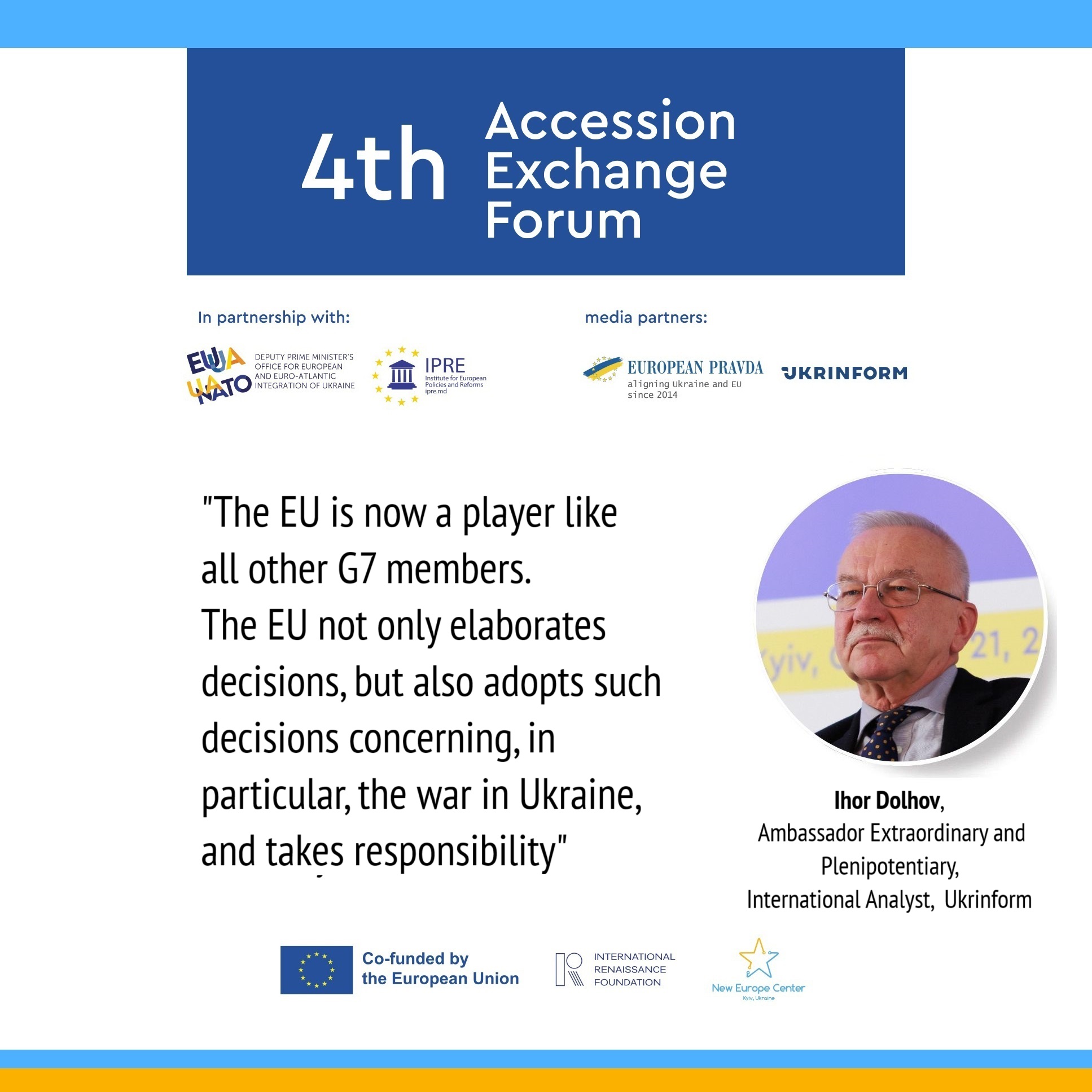
Ihor Dolhov, Ambassador Extraordinary and Plenipotentiary, International Analyst, Ukrinform, Ukraine:
– The EU delegated the mission of defeating Russia to Ukraine, but this challenge can make Europe a true global player. The war in Ukraine triggered many things, including the transformation and transition of the European Union into a global player;
– The EU is now a player like all other G7 members. The EU not only elaborates decisions, but also adopts such decisions concerning, in particular, the war in Ukraine, and takes responsibility;
– After the start of the Russian aggression, Ukraine is fighting for the future in the European Union. Every day, the Ukrainian Armed Forces confirm, reconfirm, and repeat that we are fighting for Europe, we are fighting for the European future of Ukraine. There is no choice for the EU to enlarge itself or not. If not, then these territories will be immediately occupied by Russians;
– If the EU thinks in global terms, as a global player, then it is in its core interest to be bigger, stronger, and more competitive. To compete, the EU needs to have more resources and more power. Ukraine is a part of that power;
– For the EU, it is not a question that the Ukrainian Armed Forces and Ukraine itself are the keystone of the future security architecture;
– The EU and European countries are also at war with the Russian Federation – economically, through subversion, propaganda, interference;
– To be protected, you have to pay. Europe continues to not understand that everything has its price, especially freedom and independence.
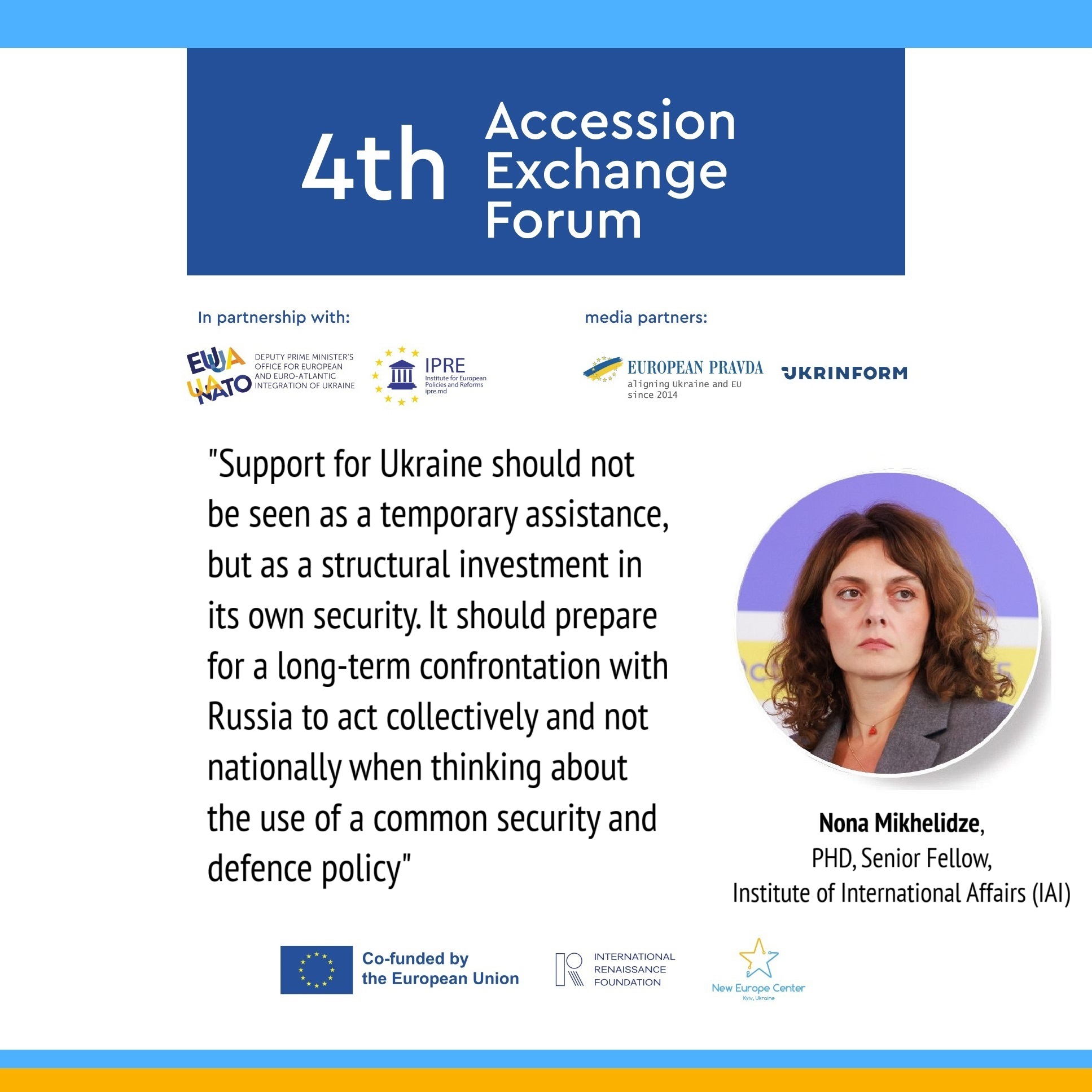
Nona Mikhelidze, PHD, Senior Fellow, Institute of International Affairs (IAI), Italy:
– Europe still, and especially the southern part of Europe, considers the war as a bilateral confrontation between Ukraine and Russia. It isn’t seen as an aggression against Europe. If Europe fails to understand that it’s really Russia’s war against Europe, then it risks giving only this kind of temporary response;
– There’s a misperception in the EU about Russia’s strengths and weaknesses. The diffuse idea in the present international debate is that the war exposed somehow Russia’s weaknesses. And if Russia did not manage to win against Ukraine in four years, it is not in a position to challenge the NATO countries or to threaten Europe.
And this is the reason that also explains Europe’s passivity in response to the war;
– Russia doesn’t necessarily need to invade European countries with tanks. It can perfectly threaten with drones, cyberattacks, pressuring energy or migration routes, with disinformation;
– Europeans should assume that a security guarantee from the US is not an automatic position. We cannot take it for granted, which means that if the US steps back, Europe has to step forward. So we have to assume major responsibility for our own security, and also take responsibility somehow to substitute the US when it comes to the support for Ukraine;
– Ukraine and its capability to defend itself in a large-scale war with limited resources are examples from which Europe has to learn. Ukraine cannot be treated merely as a security recipient, but as a security provider to Europe and to European defence;
– Support for Ukraine should not be seen as a temporary assistance, but as a structural investment in its own security. It should prepare for a long-term confrontation with Russia to act collectively and not nationally when thinking about the use of a common security and defence policy;
– Europe now should step forward in defending Ukraine and not rely on other actors. Still, the EU is reluctant to provide an adequate answer to what is happening when the security threat is real. We lack more reactive responses and a proactive policy to the upcoming threats.
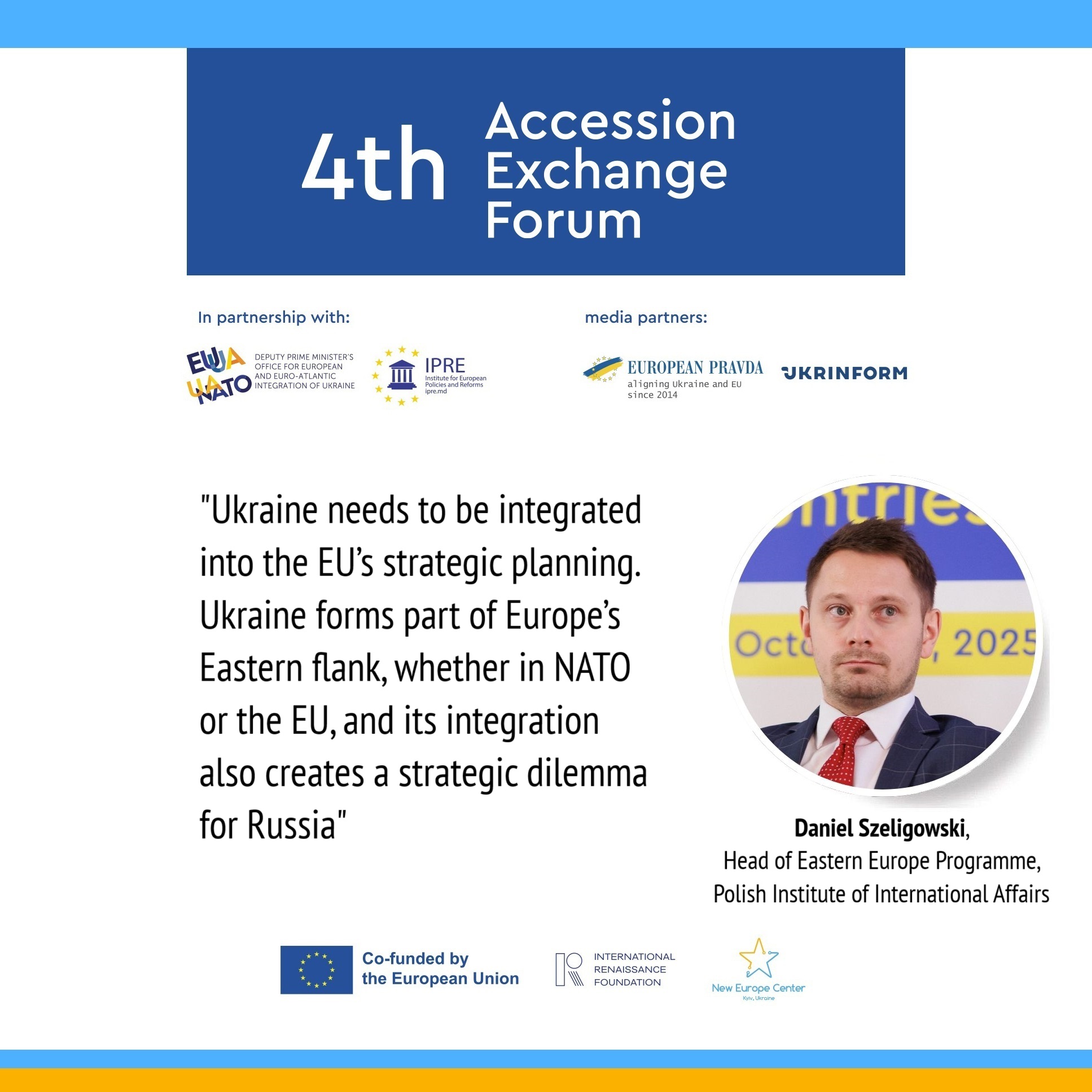
Daniel Szeligowski, Head of Eastern Europe Programme, Polish Institute of International Affairs, Poland:
– Without proper security conditions, EU enlargement simply will not happen. We should not treat the European Union as a silver bullet to solve all our problems;
– There are several problems why closer, deeper cooperation in terms of defence is not happening in Europe. There is still a problem with trust between several countries in Europe. We have neither the same concept of Ukrainian victory nor of Russia losing the war. The other problem is the political cost of changing the alliance and its whole security system;
– You cannot move Ukraine, nor can you move Russia. The geography is fixed. Ukraine needs to be integrated into the EU’s strategic planning. Ukraine forms part of Europe’s Eastern flank, whether in NATO or the EU, and its integration also creates a strategic dilemma for Russia;
– Three things really matter in defence organization, and we usually focus on two, which are technology and financing. The third, which is really important here for the countries in the region, is how quickly you may put it together in order for it to work. The perspective of having different concrete defence capabilities in five or ten years isn’t really welcomed by many EU countries;
– The claim that Ukraine cannot join the EU during the war is a political argument, not a legal one. It’s a smokescreen for the lack of consensus in Europe.
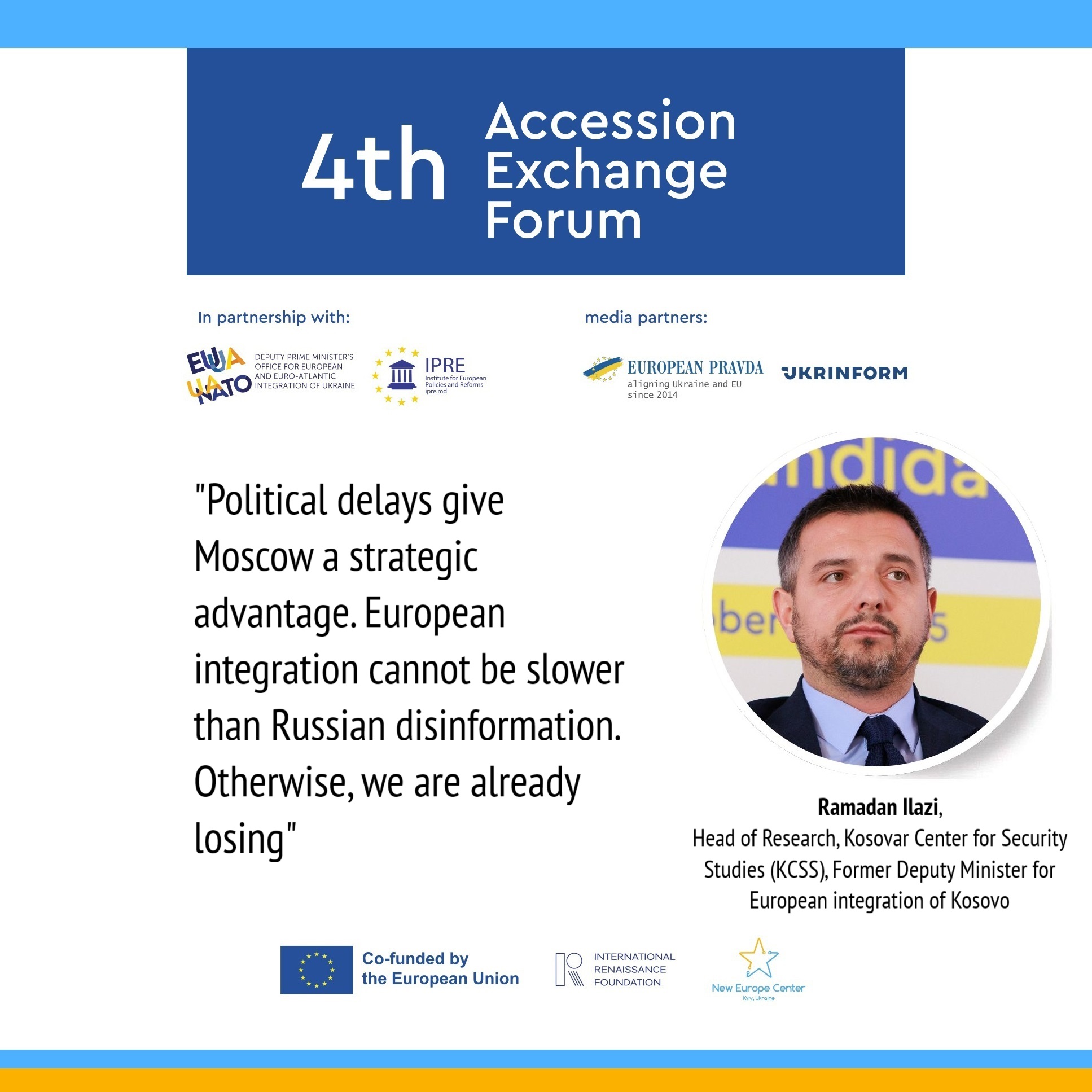
Ramadan Ilazi, Head of Research, Kosovar Center for Security Studies (KCSS), Former Deputy Minister for European integration of Kosovo:
– Ukraine is fighting and spilling blood to protect the very idea of Europe, and this outweighs any technocratic transformation;
– Before the full-scale invasion, we were preparing for a potential conflict in Bosnia. Russia’s invasion of Ukraine saved the Western Balkans;
– Europe is, and sees itself as, a peace project. Ukraine has defended the continent and has reminded the EU of the very reason why this project existed;
– Russia has an intelligence and military center in a candidate country for EU membership, and there is no pressure to close it;
– Political delays give Moscow a strategic advantage. European integration cannot be slower than Russian disinformation. Otherwise, we are already losing;
– Saying Ukraine cannot join the EU because it is at war is not fair. EU member states have fought each other before, think of Northern Ireland or Cyprus;
– Having Ukraine inside the EU would strengthen the fight against Russia, not weaken it.
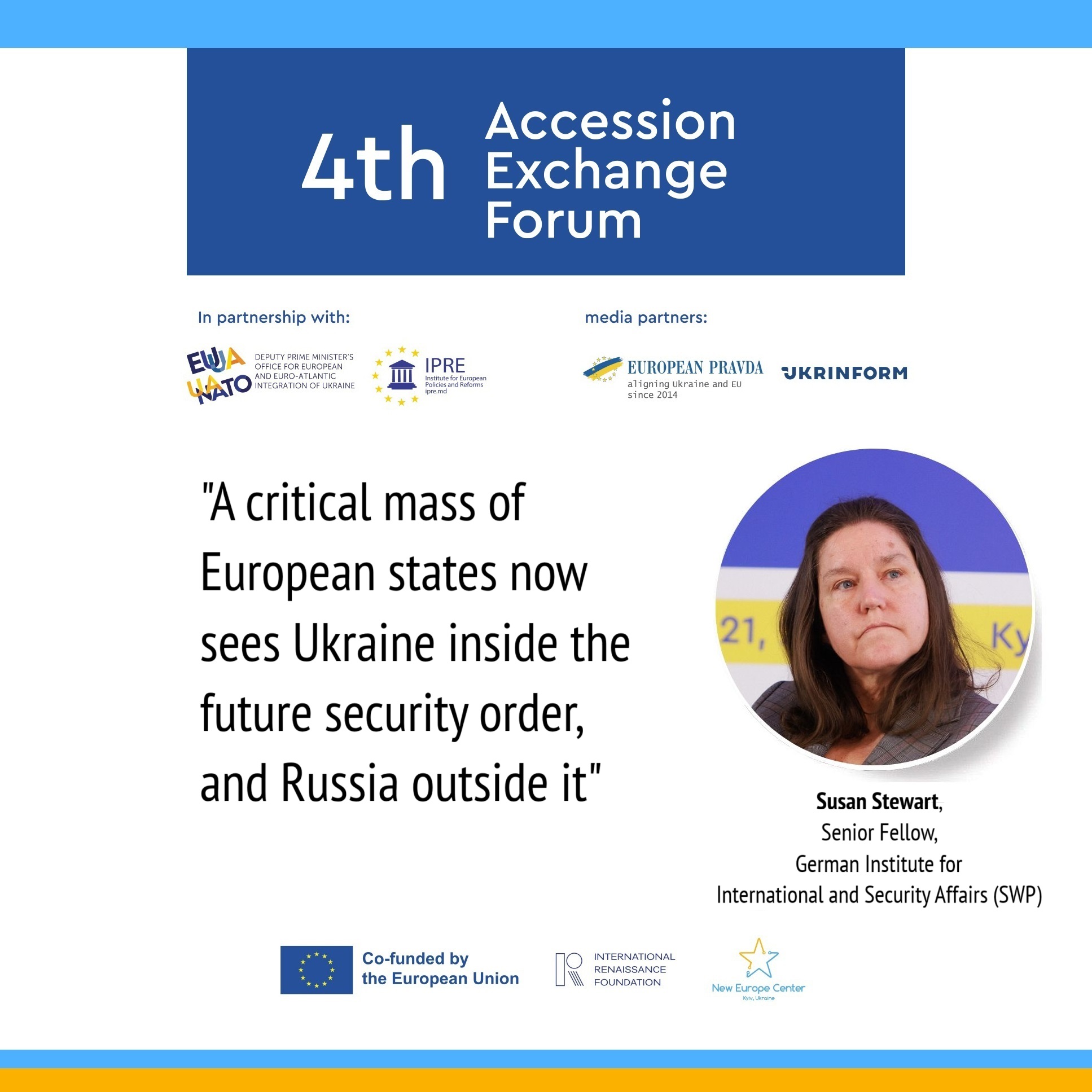
Susan Stewart, Senior Fellow, German Institute for International and Security Affairs (SWP), Germany:
– A critical mass of European states now sees Ukraine inside the future security order, and Russia outside it;
– The EU is increasingly regarded as a genuine security actor, more so than in previous years, though internal debates persist regarding the balance of competencies between Brussels and member states in security and defence;
– There is a need for Ukraine to operate on several tracks simultaneously: bilateral cooperation with key states (e.g., Denmark, Germany), mini-lateral as well as ad hoc formats such as the Coalition of the Willing, and deepening engagement with Brussels, including mechanisms like SAFE;
– Ukraine must learn to navigate ongoing intra-EU power struggles while advancing its accession and integration goals;
– Because Ukraine is now highly attractive as a defence and security partner, there is a risk of ending up with concentric circles – deeper integration in security, but weaker integration in areas like the economy or agriculture;
– Broad, multi-sectoral integration is vital to prevent future arguments from those who may welcome Ukraine as a security provider but resist its full EU membership in other domains;
– A kinetic attack on a NATO state would shift the focus to that immediate crisis, and might even reduce the appetite to incorporate Ukraine, so as not to ‘exponentially increase’ the problem;
– The increasing Russian hybrid and kinetic pressure could also strengthen the understanding that Ukrainian and European security are indivisible. We are already on that trajectory, and further attacks may reinforce the sense that the security of Ukraine and that of Europe are the same.
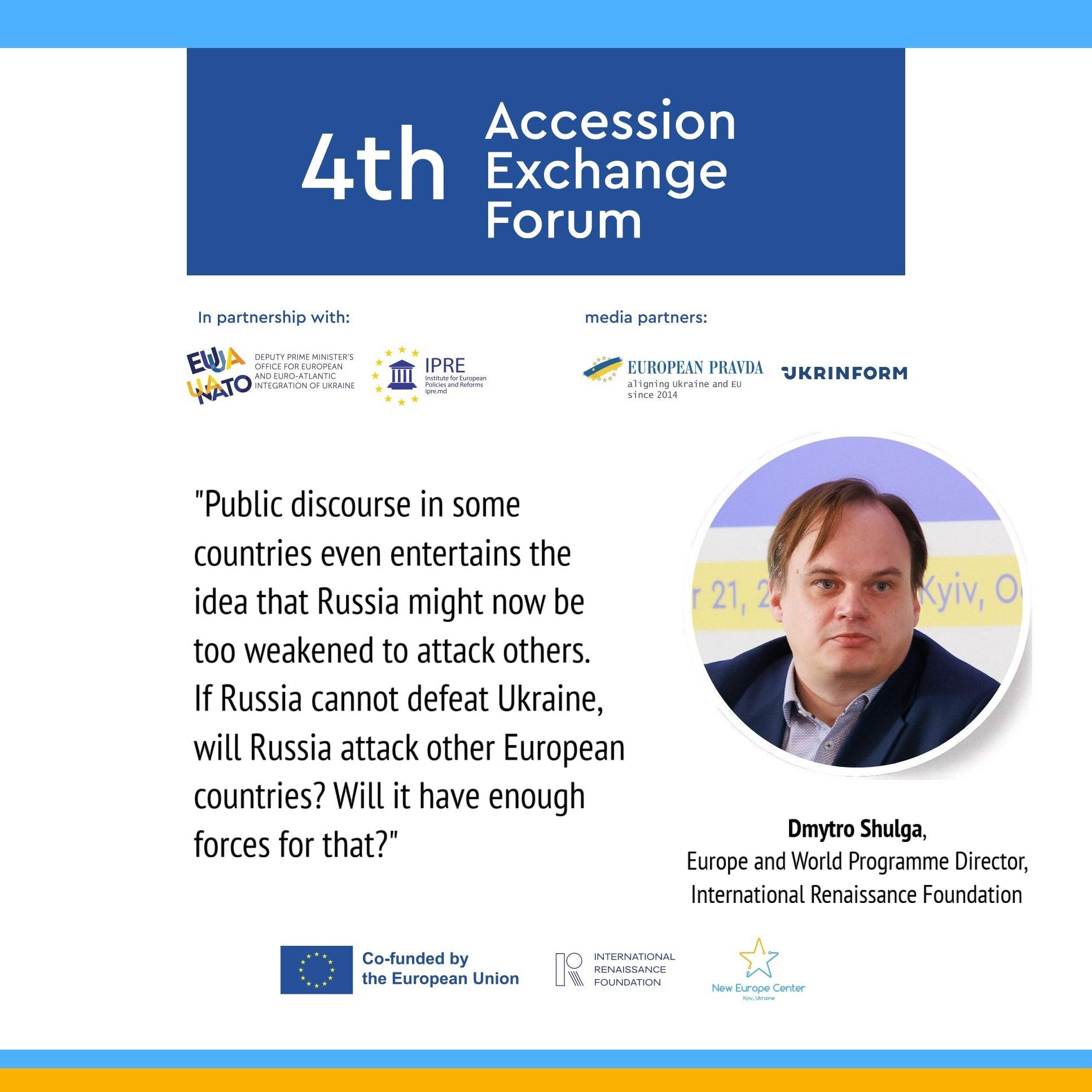
Moderator: Dmytro Shulga, Europe and World Programme Director, International Renaissance Foundation, Ukraine:
– Some EU and NATO member states still hesitate to define Russia unequivocally as a threat. After Georgia, after Crimea, after the full-scale invasion, we are still talking about the way Europe should react to Russia;
– Public discourse in some countries even entertains the idea that Russia might now be too weakened to attack others. If Russia cannot defeat Ukraine, will Russia attack other European countries? Will it have enough forces for that?;
– Some European political debates assume there is time, perhaps until 2030, to prepare, relying on US protection and avoiding escalation. Such assumptions are misplaced;
– Europe’s current security window is entirely dependent on Ukraine’s defence. Without the Ukrainian Armed Forces’ sacrifice, we could be having a very different discussion in a very different place;
– I am not sure that the Russians have the same calculations as Europeans about time, about strength, about the level of American involvement;
– Russians started aggression because they thought they would win, and they continue the war because they think they are winning;
– If there is a denial that Russia is a threat, we start from zero. It becomes a vicious circle of threat perception, readiness to react, and how exactly we react;
– We need to win this debate. We all understand that Russia is a threat and that Europe must do more, and Ukraine is a crucial part of this whole system.
Watch the full recording of the Forum on New Europe Centre`s YouTube channel .
The EU Accession Exchange Forum is organized by the New Europe Center in partnership with the Office of the Deputy Prime Minister for European and Euro-Atlantic Integration of Ukraine, the International Renaissance Foundation, and the Institute for European Policies and Reforms (Republic of Moldova), with Ukrinform and European Pravda serving as media partners. The EU Accession Exchange Forum is taking place with EU support, within the EU-funded “Whole-of-Society Accession” project implemented by the International Renaissance Foundation.





